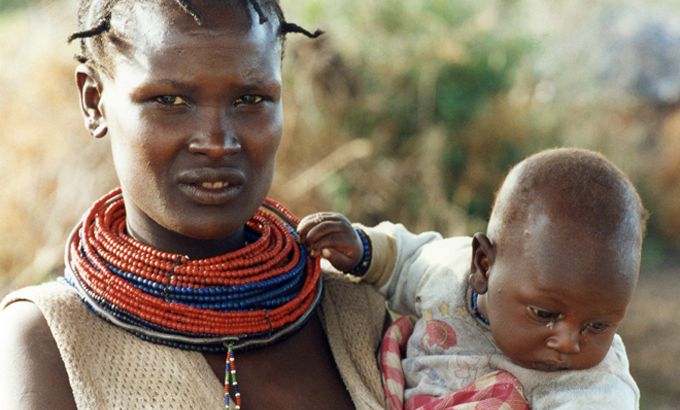
Blood and land: Erodo’s story
Can Erodo, a nomadic Turkana in Kenya, get the education he strives for?
Filmmaker: Bruno Sorrentino
From the moment he was born, Erodo, a Kenyan boy born to a tribe of cattle nomads in 1992, has had his life documented by filmmaker Bruno Sorrentino.
Keep reading
list of 4 itemsPalestinian Prisoner’s Day: How many are still in Israeli detention?
‘Mama we’re dying’: Only able to hear her kids in Gaza in their final days
Europe pledges to boost aid to Sudan on unwelcome war anniversary
Over the last 20 years his life has been shaped by ethnic violence and by the tension between his father’s desire to continue the old traditions of herding and his mother’s belief that settled society and education are the future.
| Filmmaker’s view |
By Bruno Sorrentino
In 1992, I was lucky enough to be asked to travel the world, and film the lives of a dozen babies born in that year in as many countries.
This would turn out to be a life-long project, filming at intervals throughout the 1990s and into the new millennium, capturing the big issues facing the planet through the unfolding lives of my chosen infants and their families.
The UN Earth Summit in Rio was also held in 1992, and my brief from TVE, the production company behind the idea, was that each of the lives followed would somehow trace the progress (or lack of it) towards a better environment, more sustainable development and greater social equity.
It was the ultimate ‘slow-burn assignment’, a rare chance to work outside of that box defined as ‘the production schedule’.
That was the original idea. But of course each of the children’s stories turned out differently. Real life is so much more interesting.
Once I had decided back in 1992, where in the world to film, my immediate problem was: how to choose the babies? The obvious answer: choose the parents!
In East Africa, my chosen location was a semi-arid area north of the small town of Isiolo in northern Kenya.
There I met Esther – one of 18 pregnant women my brilliant researcher, Nicholas Leaburia, had lined up for me to meet in the shade of a giant acacia a few kilometres to the north of town.
It was immediately obvious that she was the woman who’s child’s life I would be following. There was something special about Esther, and her child was not even born yet. I think you will agree with me when you see the film.
Esther and her husband Christopher Loriot were from the Turkana tribe, semi-nomadic herders. But their way of life was threatened by on-going droughts, runaway population, growth and increasing lawlessness as they came under attack from marauding shiftas, armed cattle rustlers from rival tribes. And the growing competition for land was not just a human conflict – herds of hungry elephants roaming from game reserves would sometimes attack and kill their cattle. This was the world into which Erodo was born. How would his life be affected?
I returned a few months later to start filming.
Nicholas informed me that the family’s tiny hamlet of Chumviere had been abandoned, following attacks from shiftas. I had limited time with an expensive film crew, and now there was no one to film.
But two nail-biting days later, Nicholas’ network of helpers located the whereabouts of Esther, Christopher, and their new baby Erodo. They’d set up a temporary camp near a ridge some 16km to the north-east. There I met the newly born baby Erodo, and filmed the first sequences of our documentary.
When I returned, barely two years later, the first of a long series of deaths had occurred: Nicholas, my researcher had passed away – before dying he had asked his wife Ambrosia to take over and maintain contact with Erodo’s family.
Ambrosia became my new assistant, but by my next trip she too had died, and so it was to be with seven local helpers passing away, for reasons ranging from HIV/AIDS to elephant attacks and shootings by shiftas.
One year the news came through that father Luigi Locati, the Italian priest who had been my first point of reference, helping me with logistics and transport, as well as allocating Nicholas to me, had also died – gunned down one afternoon as he walked back to his residence.
Father Locati had lived in Isiolo since 1964, establishing a network of schools, and the local church. As I returned through the years, I became accustomed to the idea of sudden death among people in the prime of life as a regular fact of life in these parts.
Throughout the 1990s I saw Erodo and his family uprooted at various times following attacks by shiftas and rival tribes.
Erodo’s mother Esther saw the writing on the wall. “The world is changing and I no longer see a future in nomadism. I want to send Erodo to school.”
This idea was to put Esther into conflict with her husband – and with the senior wife in their polygamous marriage: “Just who does Ester think she is that her son should go to school? Herding is good enough for my boys…”
The scene was set for a Turkana kitchen soap. But worse, from Erodos’ point of view, was the fact that his mother was almost always pregnant – usually against her will.
Nomadic societies traditionally operate a system of ‘bridewealth’ – upon marriage the groom’s family give livestock to that of the bride. When their children eventually marry, further exchanges of cattle take place, extending the wealth and influence of the father. The custom runs counter to any notion of birth control – why would father want fewer children?
At one stage Esther tried to control her fertility with help from a local clinic – but the final decision as to how many babies to have was not hers. “My husband’s mother decides how many babies I should have, and when…” The stresses in Esther’s life, and by extension, Erodo’s, have played out over the course of his life.
In recent years there have been some extraordinary twists in his life. Thankfully – and very luckily – he is alive having escaped some narrow brushes with death.
Erodo’s life has a rich story to tell, mirroring many of the problems of life in this region. It ultimately teaches us that development cannot take place without security.
It is a story of resilience and resourcefulness in the face of huge difficulties – obstacles and dangers which most people in richer countries would have no clue as to how to survive – made all the more extraordinary by the ‘everyday attitude’ that those living there display towards their often perilous lives. I just hope that Erodo’s luck and inner resilience keep him safe as he sets out to make his way in the world.
Click here for more Witness films. |
